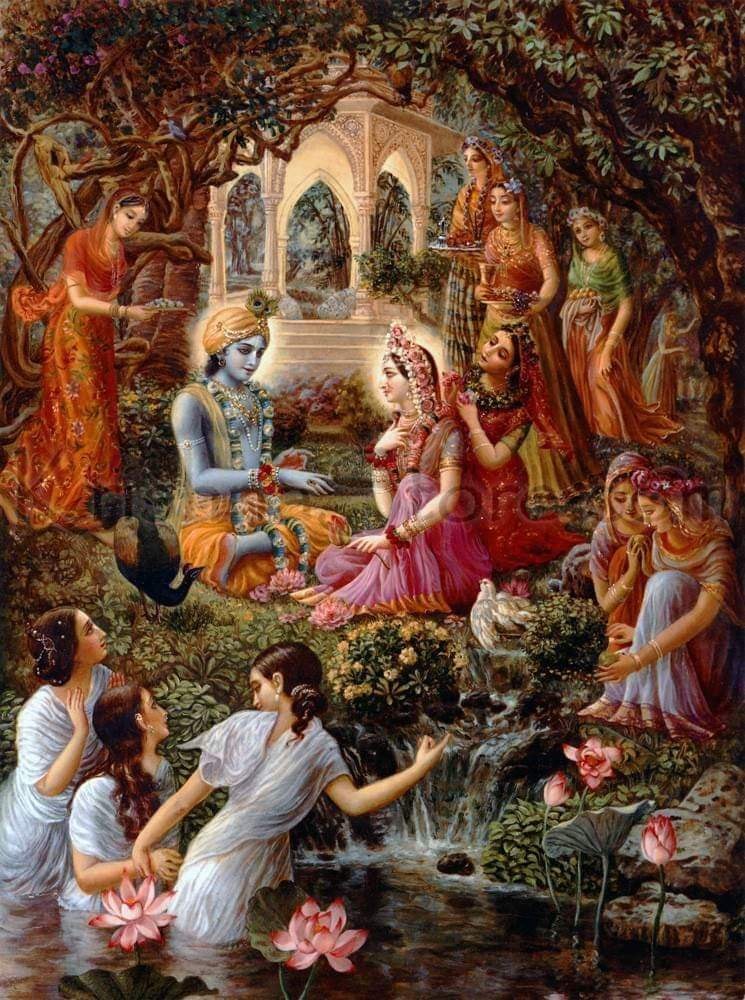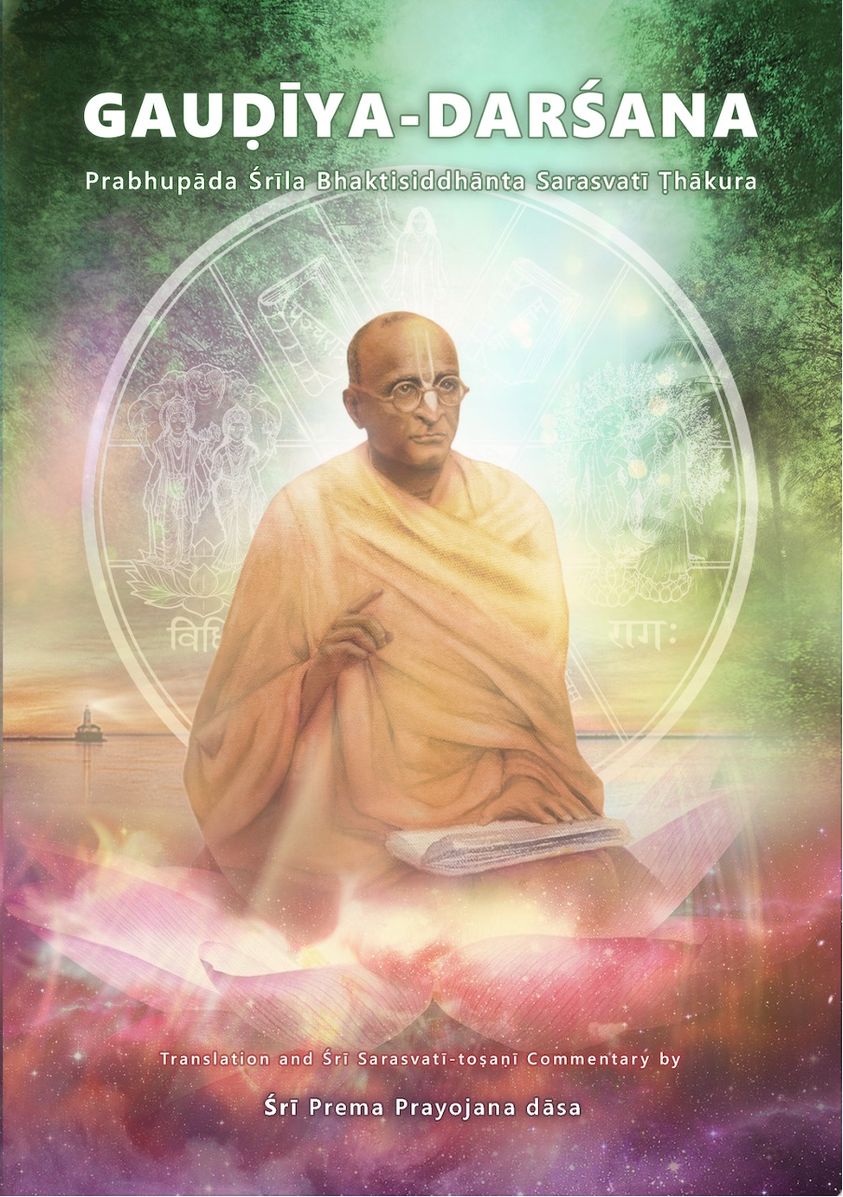
thc.jpg
Due to this external energy, the living entity, although transcendental to the three modes of material nature, thinks of himself as a material product and thus undergoes the reactions of material miseries. The material miseries of the living entity, which are superfluous to him, can be directly mitigated by the linking process of devotional service.
Maya Material Nature Personified
(based on Tattva-sandarbha by Jiva Gosvami, chapters 30-33)
Definition:
Maya: That which can be measured is maya.
mayam tu prakrtim vidyan mayinam tu mahezvaram
Translation
"Although maya [illusion] is false or temporary matter, prakrti, (the background of maya is) the supreme magician, the Personality of Godhead, the supreme controller."
(Svetasvatara Upanisad 4.10)
Sri Suta Gosvami is describing the trance of Srila Vyasadeva, the writer of the Srimad Bhagavatam, whose trance outlines the principle to be established in this book.
"Thus he fixed his mind, perfectly engaging it by linking it in devotional service [bhakti-yoga] without any tinge of materialism, and thus he saw the Absolute Personality of Godhead along with His external energy, which was under full control.
"Due to this external energy, the living entity, although transcendental to the three modes of material nature, thinks of himself as a material product and thus undergoes the reactions of material miseries.
"The material miseries of the living entity, which are superfluous to him, can be directly mitigated by the linking process of devotional service. But the mass of people do not know this, and therefore the learned Vyasadeva compiled this Vedic scripture [Srimad Bhagavatam], which is in relation to the Supreme Truth.
"Simply by giving aural reception to this Vedic scripture, the feeling for loving devotional service to Lord Krsna, the Supreme Personality of Godhead, sprouts up at once to extinguish the fire of lamentation, illusion and fearfulness.
"The great sage Vyasadeva, after compiling the Srimad Bhagavatam and revising it, taught it to his own son, Sri Sukadeva Gosvami, who was already engaged in self-realization." (Srimad Bhagavatam 1.7.4-8) Click to read the Sanskrit for the above verses
The verses describing the trance of Srila Vyasadeva are pregnant with the import of the Srimad Bhagavatam and they form the basis of that great work. Here the term bhakti-yogena (SB 1.7.4) means by prema, or love of Godhead, because only prema can give one the vision of the Supreme Personality of Godhead along with His potencies. This is also indicated by the word amala, or the pure heart.
Srila Jiva Gosvami concludes therefore that it is only by the influence of this prema bhakti that Srila Vyasa realized in His trance the Bhagavat-tattva along with the maya-tattva, jiva-tattva, and the bhakti-tattva. He saw the selfsame Personality of Godhead, Lord Sri Krsna, along with His internal, external, and marginal potencies. The material creation is the manifestation of His external potency and the living entities are of His marginal potency. Only the living entity gets bewildered and subdued by His external potency, Maya.
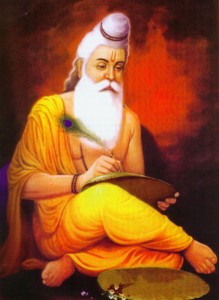
Srila Vyasadeva
In his pure state the living entity is completely free from the external potency, but when subjugated by Maya he considers himself material. This conditions him to accept repeated birth and death, which, like a diseased condition, is unnatural for the living being. He also saw the solution – bhakti-yoga, or devotional service unto Lord Adhoksaja, beginning with hearing His pastimes. This was unknown to humanity and so Vyasadeva compiled the Srimad Bhagavatam to propagate it.
When it is said that Sri Vyasa saw Him (the Lord), it is naturally understood that he saw Him along with His svarupa sakti, or internal potencies, just as when a person sees a full moon it is implied that he sees it with its full effulgence. Thus Arjuna said (SB 1.7.23):
"You are the original Personality of Godhead, controller of all the creation and transcendental to the material energy. You have cast away the effects of the material energy by Your spiritual potency and You are always in transcendental bliss."
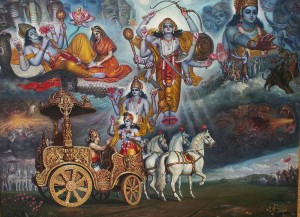
Arjuna said: “You are the original Personality of Godhead”
Therefore the phrase mayam ca tad-apasrayam, "Maya, although dependent on Him, is away from Him" and since she stays hidden from Him she does not constitute His svarupa, or essential nature. As said later on, "Maya, feeling shy, stays concealed from the Lord." (SB 2.7.47)
Sri Vyasa saw the Lord along with His potencies, just as one always sees the full moon along with its light. The Lord always exists with His potencies, in as much as the attributes of an object are always present along with the object. In the Visnu Purana the attributes of Bhagavan, the Supreme Personality of Godhead are listed (Visnu Purana 6.5.79):
jnanasaktibalaisvaryya viryya tejamsyasesatah
bhagavacchabda-vacyani vina heyairgunadibhih
"The word bhagavan indicates knowledge, sensory power, strength, wealth, prowess, and valor, all without limit, being completely devoid of material qualities or their effects".
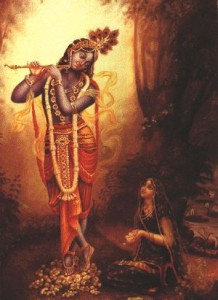
Radha and Krishna
He has multifarious potencies, out of which three are predominant. The Visnu Purana (1.12.68) states: hladini sandhini samvit tvyyeka sarvasamasraye, "The hladini, sandhini, and samvit potencies exist only in the Lord, who is the shelter of everything". Hladini is the pleasure potency, sandhini, the supporting potency, and samvit, the cognition potency. These three potencies form the svarupa, or the essential nature of the Lord. Srila Jiva Gosvami gives a detailed explanation of these potencies in the Bhagavat Sandarbha. More info
Besides the three internal potencies Vyasa saw the Lord's external potency (Maya) and His marginal potency (jiva). Maya is not part of the Lord's svarupa. She has her personification as well, but she remains away from Him. The import is that she has no influence over the Lord or His internal potencies. Generally a female influences a male by appearing before him, but the external energy, Maya, personified as a female, has no such relationship of influencing the Supreme Lord. Thus it is said, maya paraity abhimukhe ca vilajjamana (SB 2.7.47) "Mayadevi feels ashamed to come in front of the Lord and keeps away from Him". Srila Baladeva Vidyabhusana compares her to a maidservant who renders service outside the king's inner quarters. She does not have the same privilege as the queens, likened to the internal potencies, who can associate directly with their Lord at all times.
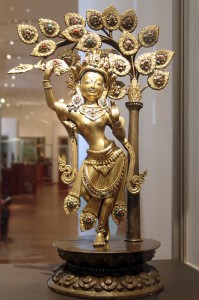
Maya Devi
The external potency, although an energy of the Lord, is inferior to His svarupa sakti and to His marginal energy as well. Still, the jiva, being marginal, can be subdued by her. This is shown in verse 1.7.5 of Srimad Bhagavatam:
yaya sammohito jiva
atmanam tri-gunatmakam
paro 'pi manute 'nartham
tat-krtam cabhipadyate
"Being bewildered by the external energy, the living entity, although transcendental to the three modes of material nature, thinks of himself as a material product and thus undergoes the reaction of material bondage".
Although the individual soul and the Supersoul are both conscious and inhabit the same material body, only the jiva is bewildered by Maya and suffers the material miseries. This is because the Lord is the master of Maya. She exerts no influence over Him. By His inconceivable potency He is forever unaffected by Maya.
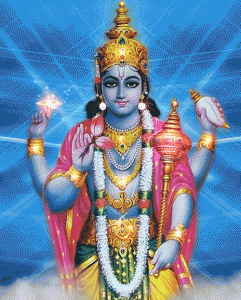
The Supersoul
Another point is that in Vyasa's trance no explicit mention of the Supersoul, the controlling agent of Maya, is made, nor is the impersonal Brahman effulgence of the Lord mentioned. Supersoul, or Paramatma, is the expansion of the Lord that presides over the affairs of the material energy. Lord Krsna says in Bhagavad-gita, mayadhyaksena prakrtih suyate sa-caracaram (Bg. 9.10), "This material nature is working under My direction, producing all moving and non-moving beings." Here "My" refers to His Paramatma expansion, for it is through this feature that He regulates the workings of the material world. Srila Jiva Gosvami points out that since the Paramatma springs from Krsna and is entirely dependent on Him, there is no need for its separate mention in describing Vyasadeva's trance.
"Maya alone is responsible for deluding the living being and the Lord is indifferent. As seen later in Srimad Bhagavatam, "The illusory energy of the Lord cannot stand in front of the Lord, being ashamed of her deeds, but foolish people deluded by her, speak proudly of 'I' and 'mine'." (SB 2.5.13)
Here the phrase "being ashamed" means that she knows her bewildering the living beings is not pleasing to the Lord, yet she is unable to tolerate that they have turned their backs on the Lord. This is explained in the Srimad Bhagavatam: "Being attracted to something other than the Lord the living beings become fearful" (SB 11.2.37). Hence she covers their real nature and attracts them to matter since time immemorial.
When a jiva does not desire to serve the Lord, then Maya cannot tolerate that. She covers his knowledge and simultaneously casts him into a material body. These are the chief functions of Maya, to punish and to rectify the jiva who has turned his back on the Lord. The purpose of the punishment is not to inflict pain on the jiva, but to rectify him. That's why Krsna says in the Bhagavad-gita that transcendental knowledge burns all the bondage of karma, just as fire burns fuel, because once a person has transcendental knowledge punishment has no purpose.
One may ask "If the Lord is all powerful, why does He not intervene?" The answer is that the Lord has appointed Maya the presiding deity of the material creation and she has been performing this service faithfully since time immemorial. Out of kindness upon His devotee, He does not interfere with Maya's activities.
But this leads to further doubt. The Supreme Lord is said to be unlimitedly merciful and always thinking of everyone's welfare, but if He cannot stop Maya from harassing the jiva, although being capable, then how can He be considered all-merciful?
To this Jiva Goswami replies that although the Lord does not stop Maya, He instructs the jiva how to get free from the clutches of Maya – surrender to Him. Then Maya will never harass that jiva again.
But the problem remains that Maya creates obstacles for the jiva when he wants to surrender to the Lord. Why does she baffle his attempts by presenting various allurements and obstacles so that he remains indiscriminate about proper and improper acts?
For the solution Srila Jiva Goswami quotes Lord Kapiladeva (SB 3.25.25) satam prasangan mama virya-samvido… This verse explains that devotees of the Lord, in the favorable association of each other, always relish talking about the Lord's pastimes, which is a tonic to the heart and ears of the sick and weak jiva. This tonic gives him immunity to the Maya disease and slowly he attains the healthy state of life, devotional service. The Lord, whose only business is to enjoy rasa, does not want unhealthy jivas to approach Him and cause disturbance. Maya, therefore, by her allurements and obstacles makes sure that no unfit souls bother Him. This is her service to Him and so He does not interfere with her activities.
The Personality of Godhead, however, has not employed Maya just to inflict miseries on the jiva. She does that, but her real motive is to chasten the jiva, to give him impetus to turn to the Lord. The reason for punishment is twofold – to mete out the reaction for sinful deeds and to deter the wrong-doer from further transgressions. Since this brings ultimate good to the jiva by uniting him with the Supreme Lord, the Personality of Godhead never comes between the jiva and Maya. When a criminal is sent to prison the chief-of-state does not interfere. Rather, if the police do their service well, they get commended. No one thinks a leader unkind or inconsiderate for having such able policemen. And the underlying principle is that when a criminal is rehabilitated he is freed.
Similarly, God has not created this material world just to cause suffering for the jiva. His purpose is to bring the jiva to the platform of surrender and loving service. This alone brings them liberation from Maya's clutches. As confirmed by Sukadeva Gosvami (SB 10.87.2):
buddhindriyamanah pranan jananamasrjat prabhuh
matrarthanca bhavarthanca atmane 'kalpanaya ca
"O King, the Lord granted intellect, senses, mind, and life airs to the human beings so that they can engage their senses in sense objects, go through the cycle of birth and death, enjoy heavenly pleasures, and finally come to the platform of liberation."
Maya troubles the jiva only up to the point of becoming a pure devotee, beyond that she has no power over any jiva.
Still, one may charge that although the Lord is not cruel, He is indifferent to the plight of the jiva. Such is not the case. He is not indifferent to the jiva's suffering, because sometimes, on the plea of educating His associates, such as Arjuna and Uddhava, He appears in the material world and instructs the jiva. Sometimes He incarnates in forms such as Veda Vyasa and others and, taking the part of an instructor, He preaches the message of bhakti just to uplift the wretched jiva. All this He does out of his causeless mercy, because by their own endeavor no jiva can ever understand anything beyond this material world.
Out of His causeless mercy, therefore, the Supreme Lord gives the entrapped jivas access to spiritual knowledge through the Vedas. Later, when the comprehensive power of the jivas diminish, to further accommodate them, He explained the same message of the Vedas through the Itihasas and Puranas. Then He gave the essence of all knowledge in the form of the Srimad Bhagavatam. So He is not at all indifferent to the plight of the jivas.
Once a jiva takes advantage of the Lord's arrangement and comes to the point of transcendental realization, he is not even punished for his previous misdeeds no matter how dreadful. The Lord says in the Bhagavad-gita (4.37):
yathaidhamsi samiddho 'gnir
bhasma-sat kurute 'rjuna
jnanagnih sarva-karmani
bhasma-sat kurute tatha
"As a blazing fire turns firewood to ashes, O Arjuna, so does the fire of knowledge burn to ashes all reactions to material activities."
Thus the Lord confirms that the purpose of punishment is not to inflict suffering on the jiva, but to awaken him to knowledge, which leads to discrimination.
But a further doubt may be raised. If the punishment meted out to the jiva is for his ultimate good, why is there some happiness endowed to him? If the jiva was thrown into continuous pangs of misery and hardship he would be obliged to take complete shelter of the Personality of Godhead. This could only hasten the process of surrender.
The answer is that in the first place there is no real happiness in this material world. In the Bhagavad-gita (8.15) the material world is described as temporary and devoid of happiness. The so-called happiness that one experiences in this world is nothing but a temporary diminution or cessation of misery. It is like the happiness a person experiences when his head is dunked repeatedly in water, but he is allowed to surface just in time to keep alive. He feels great relief, but such happiness is really the absence of misery. The man doing the dunking feels no such happiness.
Lord Krsna advises us, therefore, that one should not endeavor for this so-called happiness, sama-duhkha-sukham dhiram so'mrtatvaya kalpate, "One who remains equipoised in both misery and happiness is qualified to be liberated" (Bg. 2.15). This implies that only such a person can taste real happiness. Others are tasting the illusion of happiness.
Yet the feeling of happiness one gets in material life has a purpose in that it gives the jiva an idea of happiness. If the jiva knew only misery he would not develop the desire to get out of the material world, for he will have no sense of greater and greater happiness. Rather he will be conditioned to accept misery as the all in all. On the other hand, with the experience of some sense of material happiness the jiva can conceive something about the nature of spiritual happiness which he gets confirmed through scripture – and thus he may seek it out. Thus the Lord has designed a two-part program to chasten and retrieve the jiva: On the one hand, Maya kicks him, and on the other, the Lord instructs him through various incarnations, the scriptures, and through His pure devotees. There is no incongruity, therefore, between the acts of Maya and the behavior of the Lord. The two complement each other.
Although Maya is the external energy of the Lord, she also exists in her personal form. There are many references in the Vedas and Puranas that show Maya and other energies of the Lord have their personified feature. Hence the description Vyasa seeing Maya standing behind the Lord and of her being too embarrassed to go in front of Him is not figurative.
But a further doubt may be raised, "If the predominating deity of the material energy, Maya, can manage all her affairs, what is the need for Paramatma to be its controller? This is answered in Bhagavad-gita (14.4):
sarva-yonisu kaunteya murtayah sambhavanti yah
tasam brahma mahad yonir aham bija-pradah pita
"It should be understood that all species of life, O son of Kunti, are made possible by birth in this material nature, and that I am the seed giving father."
Just as a woman cannot conceive without the help of a potent man, Maya, cannot perform the act of creation by herself. Although Maya has potencies by which she renders service to the Supreme Lord, He still has a role in her executing her affairs. Hence Vyasa saw her as dependent on the Lord. In Bhagavad-gita (9.10), Krsna says, therefore, that this material nature, which is one of His energies, is ultimately working under His direction.
bhakti-yogena manasi
samyak pranihite 'male
apasyat purusam purnam
mayam ca tad-apasrayam
yaya sammohito jiva
atmanam tri-gunatmakam
paro 'pi manute 'nartham
tat-krtam cabhipadyate
anarthopasamam saksad
bhakti-yogam adhoksaje
lokasyajanato vidvams
cakre satvata-samhitam
yasyam vai sruyamanayam
krsne parama-puruse
bhaktir utpadyate pumsah
soka-moha-bhayapaha
sa samhitam bhagavatim
krtvanukramya catma-jam
sukam adhyapayam asa
nivrtti-niratam munih

 Posted in
Posted in 






